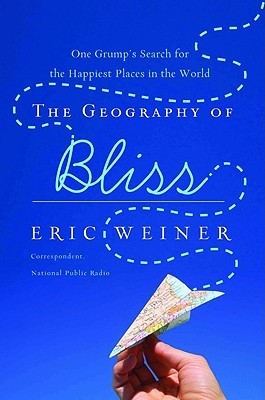
The Geography of Bliss: One Grump's Search for the Happiest Places in the World
Book Description
What if happiness could be mapped? In a world where joy is often elusive, Eric Weiner embarks on a daring quest, traveling from the snowy peaks of Switzerland to the vibrant streets of Bhutan, seeking the happiest places on Earth. Armed with wit and a heavy dose of skepticism, he uncovers the surprising truth about what makes us truly content. Through encounters with quirky locals and profound cultural insights, Weiner explores the delicate balance between environment and emotion. Can joy really be found in specific corners of the globe, or is it a journey shaped by our own perspectives?
Quick Book Summary
In "The Geography of Bliss," Eric Weiner, a self-described grump and former NPR journalist, conducts a globe-spanning search to understand the nature of happiness. Traveling to ten distinct countries renowned for varying levels of joy, from the spiritual tranquility of Bhutan to the orderliness of Switzerland and the chaos of Moldovan life, Weiner seeks answers to questions about culture, environment, and the universal quest for contentment. Blending memoir, travelogue, and social science, Weiner uses humor and skepticism as he interviews locals, happiness researchers, and expats. His journey uncovers the paradoxes, surprises, and shared threads in how different societies pursue happiness, ultimately suggesting that bliss is influenced as much by perspective and attitude as by geography itself.
Summary of Key Ideas
Table of Contents
Cultural Influence on Happiness
Eric Weiner embarks on a quest to map happiness across the world by visiting countries reputed for their high or low happiness rankings. As a skeptic, he approaches each destination with curiosity and humor, treating happiness not as a static concept, but as a complex cultural tapestry. His travels begin in the Netherlands, where he visits the World Database of Happiness, grounding his quest in scientific research. This mix of data-driven inquiry and experiential storytelling sets the tone for his exploration, uncovering how societies define and pursue happiness differently.
Environment and Emotional Well-being
In Switzerland, Weiner explores a culture obsessed with order, rules, and predictability. He notices that such environments foster a sense of stability and reduce anxiety, offering insight into the connection between environment and emotional well-being. This stability, however, may come at the cost of spontaneity or creative risk. Weiner's observations reveal that societies that prioritize collective well-being over individualism tend to report higher average contentment, echoing findings from happiness researchers while illustrating the trade-offs inherent in different societal structures.
Paradox of Choice and Contentment
The journey continues to places like Bhutan, where Gross National Happiness takes precedence over Gross Domestic Product. Weiner learns that spiritual practice, a strong sense of community, and cultural traditions foster resilience and contentment even in the absence of material wealth. He contrasts this with his visit to Moldova—often ranked among the unhappiest nations—where weak social bonds, economic instability, and lack of trust create an environment rife with dissatisfaction. The stark difference illustrates how both prosperity and adversity can shape collective outlooks.
Role of Community and Social Connections
Weiner examines the paradox of choice by comparing countries along the happiness spectrum. He observes that in nations like Iceland and Thailand, where life is unpredictable, people exhibit a tendency toward optimism and adaptability, often finding joy in small moments. Conversely, in affluent societies with endless options, people can become paralyzed by indecision or plagued by regret. Through interviews and anecdotes, Weiner illuminates how constraints and adversity can sometimes incubate gratitude and fulfillment, challenging the idea that more choice automatically breeds happiness.
Personal Perspective Versus Place
Ultimately, "The Geography of Bliss" becomes as much an inward journey as an outward one. Weiner concludes that while certain geographical factors and cultural traits can nurture happiness, personal perspective—the ability to find meaning, build relationships, and accept imperfection—plays a crucial role. His travels encourage readers to consider the habits of happy societies, but also to recognize that the pursuit of bliss is a uniquely individual endeavor. By blending humor, skepticism, and empathy, Weiner crafts a memorable meditation on the universal quest for contentment.
Download This Summary
Get a free PDF of this summary instantly — no email required.





